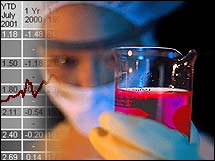|
Three little biotechs: Are they worth the risk?
Vasogen, Renovis, GTx getting ready to release high-stakes data.
NEW YORK (CNNMoney.com) - Most biotech stocks are young, hot, and risky. There's much at stake for young upstarts that are still losing money. Clinical studies, once unveiled, could suggest the entry of bold new blockbusters, or could disappoint with weak data. And once companies reach the final series of tests before a drug is submitted to the Food and Drug Administration, the results may either pave the way for profitable products or send scientists back to the drawing board, bringing gain or pain for investors.
Here are three biotechs conducting phase 3, or late-stage, tests on drugs or medical devices for cancer, heart disease and stroke, which are considered lucrative areas in the drug industry.
"If SIMPADICO and ACCLAIM are positive, this could be a $500 million to $700 million [product]," said Mark Monane, analyst for Needham & Co. "Not too shabby for a biotech." These areas are potentially lucrative for treatment because they are common in the aging U.S. population. Peripheral heart disease affects eight to 12 million Americans, according to the American Heart Association. More than 20 percent of the population over 70 years old has the disease, which increases six to seven times the risk of heart attack or stroke. As for chronic heart failure, some five million Americans are living with it, and another 550,000 are diagnosed every year. "A diagnosis in heart failure is worse than many forms of cancer, with a mortality rate of 50 percent over five years," said Vasogen chief executive officer David Elsley. "The hope for our product is to reduce the risk of death and to reduce cardiovascular hospitalization."
"Each of these indications is $500 million-plus [in annual drug sales] if the data is compelling," said Eric Schmidt, analyst for SG Cowen & Co. "If they were able to achieve that type of revenue -- $500 million -- this stock would be a home run." Prostate cancer is the most common form of non-skin cancer in America, according to the Prostate Cancer Foundation, with 232,000 diagnoses and 30,000 fatalities expected in 2006. Also, GTx is testing another drug candidate, Ostarine, to rebuild damaged muscles for burn victims. The tests are currently in phase 2 and the biotech plans to begin phase 3, or late-stage, studies this year. Chief executive officer Mitch Steiner says Ostarine could hit $5 billion in annual sales, and that Acapodene could reach $1 billion for treatment of prostate-related complications.
Stroke treatment is considered a thriving industry. About 700,000 Americans suffer strokes every year, including 157,000 fatalities, according to the American Stroke Association. "[NXY-059] could be a billion-dollar drug, because there are so many stroke victims," said Monane. Monane said that if the drug' is approved by the Food and Drug Administration, it could be on the market by the beginning of 2008, reaching billion-dollar annual sales within three to five years. Renovis would gain 15 percent of this revenue while the majority would go to its partner AstraZeneca. These sales would be significant for a small biotech like Renovis, and make it an attractive takeover target for the larger AstraZeneca. "If the drug starts selling well, maybe AstraZeneca would want Renovis to be a part of the company," said Monane. Schmidt and Monane do not own shares in the biotechs they discussed, but Needham does have an investment position with Vasogen.
To find out more about biotech industry expectations in 2006, click here. |
|

